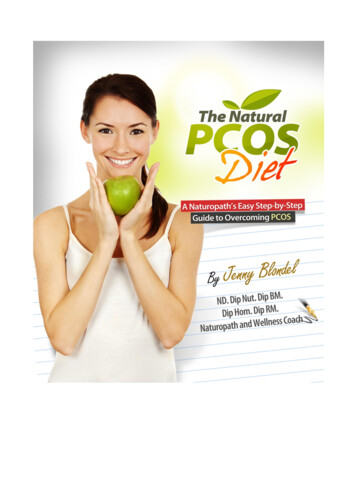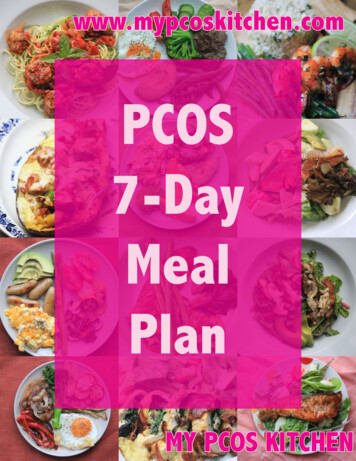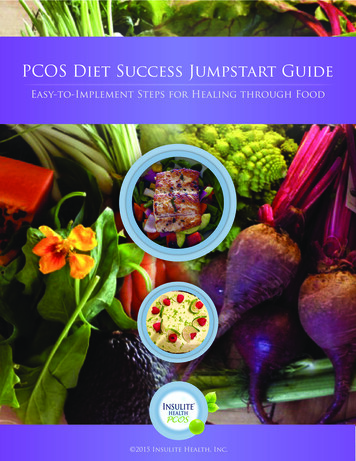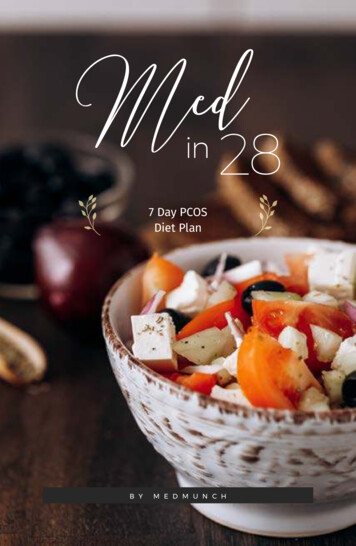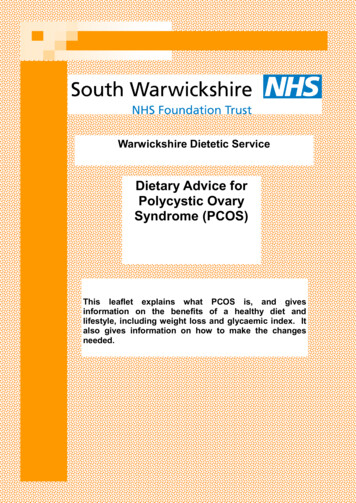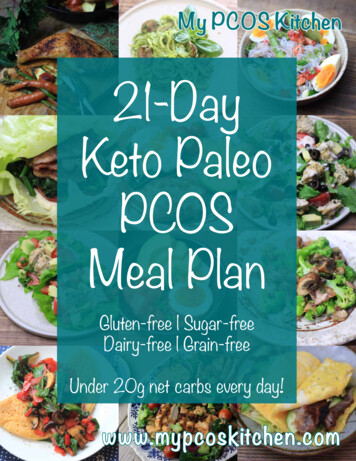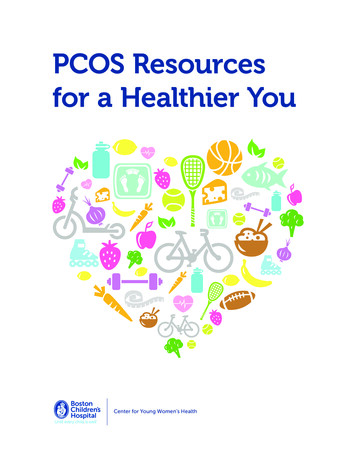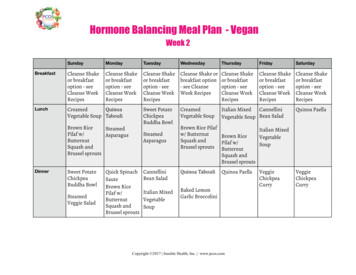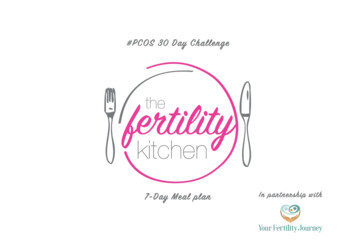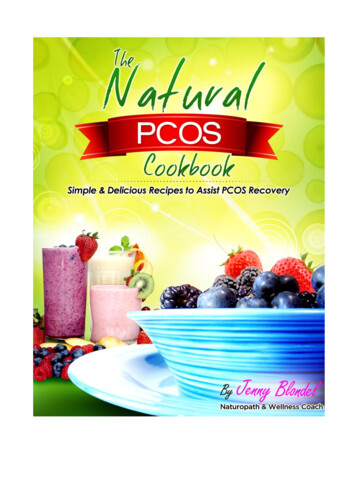
Transcription
The Natural PCOS Cookbook ContentsPagePart 1Introduction3A Reminder: The Food Groups4- Carbohydrates4- Protein4- Fats5- Water5Part 2The Natural PCOS Diet Overview6The Natural PCOS Diet Guidelines and Food Plan7A Typical Day’s Menu11Sample Weekly Menu Plan12Part 3The Natural PCOS Cookbook –Tips13Breakfast Recipes15Lunch Recipes22Dinner Recipes32Dessert Recipes45Snacks47Conversion Table52The Natural PCOS Cookbook Page 2
Part 1: Introduction:The Natural PCOS CookbookThe Natural PCOS Diet Low Carb Moderate Protein from Whole FoodsEating a healthy diet will improve your outcome for PCOS.Food is the most basic medicine that we have, and our diet choices can both prevent and promotedisease. As Hippocrates, ‘the Father of Medicine, said: “Let your food be your medicine and yourmedicine be your food”.Our food choices in the western world are endless. But what are the best choices to make whileplanning your weekly shop to the supermarket or choosing from the menu at a restaurant?With so many options these days, it is essential to be educated and informed for you to choosethe healthiest option which will best assist you to overcome PCOS.Eating in accordance with a low carbohydrate (carb), moderate protein diet from whole foods isthe key for optimal health. A whole foods diet is one that emphasizes fresh food over processedand packaged food.Foods should be consumed in their natural state, free from preservatives and additives. Fruit,vegetables, whole grains, legumes (beans), nuts, fish, and organic/free-range animal productsform the basis of a whole foods diet.In addition to eating whole foods, it is recommended to limit carbohydrate intake for those of youdealing with weight issues and insulin resistance associated with PCOS. Remember, the reason forthis limitation is when you insulin resistant, your body simply cannot handle carbohydrates as wellas someone without this condition.Ensuring you are having protein with every meal including snacks will further help to stabiliseyour blood sugar levels, provide a steady supply of energy and a feeling of fullness andsatisfaction for hours.The good news is you can take charge of your PCOS and prevent the damage of insulin resistancethrough healthy eating, exercise, and supplementation.Here are some meal plans and delicious recipes comprising of low carbohydrate, moderateprotein from whole foods for you to help overcome PCOS. Enjoy!ND. Dip Nut. Dip BM. Dip Hom. Dip RM.Naturopath, Nutritionist and Wellness CoachThe Natural PCOS Cookbook Page 3
A Reminder: The Food GroupsLearning about nutrition ‒ including the main food groups ‒ will give you a greater understandingand make it easier for you to follow The Natural PCOS Diet and the recipes found in The NaturalPCOS Cookbook.CarbohydratesCarbohydrates provide energy, essential vitamins and minerals, and valuable fibre which act likea ‘broom’ to keep your digestive tract healthy and clean.Your body needs good quality carbohydrates for energy. Eating the right type (quality) and theright amount (quantity) makes all the difference between you having a lean healthy physique orbattling with insulin resistance and carrying extra weight. The best healthy carbohydrate sourcesare fresh fruit and vegetables and low GI/GL grains.Different carbohydrates have different effects on your body. The Glycemic Index (GI) is anumerical rating that compares the ‘rise and fall’ effect of different carbohydrates on your bloodsugar levels. The Glycemic Load (GL) index is based on the GI index, and considers the typicalserving size of each type of food and the amount of carbohydrates in that serving. These valuesare more precise in terms of the amount of food you would normally be expected to eat. Whatyou need to remember is this: the lower the GI or GL, the less it affects your blood sugar andinsulin levels.Refer to The Natural PCOS Diet ‘Chapter 20: Get to Know your Food Groups’ for detailedinformation on low GI and GL foods.ProteinProtein is necessary to build muscle, fight disease, protect the skin, make hormones and forenzymes that keep our cells working. It is also essential to help balance your blood sugar levels.The building blocks of proteins, called amino acids, are essential for life. Nine of the 20 aminoacids cannot be made by the body, so must be supplied by food. If there is inadequate proteinintake then new cells cannot be made, nor can the enzymes or hormones be made that enablethese cells to operate.Complete/Incomplete ProteinsSome proteins are “complete;” others are “incomplete,” and you need them both.‘Complete’ protein (containing the 9 essential amino acids your body needs) is found mainly inmeat, fish, chicken, eggs, dairy and soy products, protein powders and quinoa.Complementary proteins are ‘incomplete’ proteins as they may lack some of the essential aminoacids. These include fruits, vegetables, grains, seeds, nuts and beans. This basically means if youfollow a vegetarian based diet, it is important to eat a wide variety of plant based protein atevery meal to make sure you get the full spectrum of essential amino acids.The Natural PCOS Cookbook Page 4
Protein needs to be part of every meal including snacks. Preferred protein foods include fish,lean organic chicken, lentils, nuts, seeds, whey protein isolate, golden pea/hemp/sprouted riceprotein, grass-fed beef and lamb, and organic eggs.Protein and Weight LossEating protein with each meal stabilises your blood sugar levels, provide a steady supply of energyand a feeling of fullness and satisfaction for hours. And because protein builds muscle, the moremuscle we have, the faster our metabolic rate is, the greater the fat-burning potential for weightloss.Fats and OilsGood fats and oils are essential to our health. Vegetable, nut, seed and fish sources provide thebest health benefits to the body. Foods such as olives, avocado, flaxseed, macadamia, grape seedare good sources of unsaturated fats, which the body needs in small quantities for optimal health.Sardines, anchovies, salmon, mackerel and mullet are good sources of omega-3 Essential FattyAcids (EFA’s), necessary for our reproductive health.Avoid trans fats and hydrogenated oils. Make sure when using oils, only use cold pressed olive oiland most nut and seed oils over salads and vegetables (do not heat). Only cook with oils that cantolerate high heat temperatures such as organic coconut oil, (grass fed) butter and ghee.WaterWater is vital for life and needed in transporting nutrients and ridding the body of wasteproducts. It is also important for skin health, controlling your appetite, keeping hunger pangs atbay, and maintaining regular bowel movements.Aim for 2 – 3 litres a day, more if you’re exercising to hydrate and replenish lost fluid.What about a cuppa?There are a variety of teas that are beneficial to our health including black tea in moderation,herb teas, green tea, white tea, and rooibos (red) tea. Studies show that those who consume oneor two cups of tea per day have a lower risk of certain cancers.Green tea’s antioxidant potential is enhanced with a slice of lemon added.Did you know. green tea is beneficial for healthy thyroid gland function and our beneficial gutbacteria!The Natural PCOS Cookbook Page 5
Part 2: The Natural PCOS Diet OverviewThe Natural PCOS Diet Low Carb Moderate Protein from Whole FoodsEating in accordance with a low carbohydrate (carb), moderate protein diet from whole foods isthe key for optimal health. The ideal diet comprises 30% good quality fats, 40% protein and 30%low GI complex carbohydrates from whole foods. These percentages can vary slightly dependingon the amount of weight that needs to be lost.Foods to include in your diet: Low GI and low GL carbohydrates from fruit and vegetables and grains such as berries,melons and quinoa. Adequate protein with every meal; examples include seafood, animal protein, eggs, nutsand seeds and yoghurt. Phytoestrogens such as alfalfa, fermented soy, linseeds, lentils and chickpeas. Organic foods whenever possible. Two litres of filtered water daily. Good oils in the form of essential fatty acids, found in nuts, seeds, flaxseed oil and oilyfish (including herring, mackerel, mullet and salmon).Some foods should be limited or completely avoided as they aggravate PCOS and may make thecondition worse. These foods include: sugar on its own and hidden in foods artificial sweeteners fruit juices, which are high in sugar (fructose), low in fibre and can rapidly raise bloodglucose levels gluten if intolerant – wheat, rye, barley, spelt, kamut, triticale, cous cous refined grain products, especially white bread. These foods have been stripped of anynutritional value, leaving a product that spikes blood sugar levels and drives yourhormones to fluctuate dairy products, such as milk and cheese. Although dairy products have a low GI, theystimulate insulin production, causing an increase in testosterone, which may cause excesshair growth and acne saturated and trans-fats and all fried foods additives, preservatives and artificial flavourings and colourings found in processed foods caffeine and alcohol.The Natural PCOS Cookbook Page 6
The Natural PCOS Diet Guidelines and Food PlanEating well and correctly is key to managing PCOS. Below are some tips to help you stay on trackand consume the right foods. Sit down for your meals. Eat slowly. Never have a second helping. Do not skip meals. Allow a maximum of four hours between meals. Aim to have about five or six small meals a day. Ensure you have adequate protein with each meal. Don’t skip breakfast as it boosts your metabolism for the day. Don’t eat within two hours of bedtime as you will most likely store the calories as fat. Do not combine two meals together e.g. brunch instead of breakfast and lunch. Cut out sugar (sweets, chocolate, cakes, biscuits, sugared soft drinks), jam, dried fruit,white flour products and fried food from your diet. Drink eight glasses of filtered water per day. Sugar-free decaffeinated beverages, greentea and herb teas can be included. Avoid alcohol or caffeine. Feel free to season food liberally with spices but use salt sparingly. Avoid or limit dairy and wheat. When in doubt, leave it out.Food PlanBreakfastProtein1 selectionFruit1 selectionGrain1 selectionFat1 selectionLunchProtein1 selectionVegetable1 selectionGrain1 selectionFat1 selectionDinnerProtein1 selectionVegetable1 selectionFat1 selection*Grain 1 selection*Fruit½ selection*Either fruit or grain; not bothMorning TeaProtein-based snackAfternoon TeaProtein-based snackNB. It is important that you eat this combination and keep to the weights and measures. This isthe secret to losing and keeping weight off.The Natural PCOS Cookbook Page 7
Protein (per serve) Meat and poultry (90 g): organic chicken, turkey, duck, grass fed beef, lamb, veal, pork,natural ham and bacon Fish and seafood (120 g fresh or 90 g tinned): sardines, salmon, tuna, lobster, crab,scallops, clams, prawns, herring, haddock, mackerel, calamari (not crumbed). Any freshfish that does not contain mercuryVegetarian Protein(per serve) 2 scoops protein powder 1½ vegetarian sausages 220 g fermented tofu 135 g tempeh 2 eggs ½ cup legumes (chickpeas, hummus, lentils) ½ cup quinoa ½ cup coconut yoghurtDairy (per serve)Either avoid or limit to: 60 g (⅓ cup) low fat cottage cheese 60 g (⅓ cup) low fat ricotta cheese 60 g low fat cheddar/Swiss/feta/mozzarella/sheep or goat’s cheese 100 g (½ cup) plain yoghurt Milk substitutes: almond, coconut, goat, oat, quinoa, rice, sheep, A2Nuts Aim for 30 g/day: almonds, brazil nuts, hazelnuts, macadamias, walnutsBeverages Water is the best selection ‒ at least eight glasses per day Herbal teas No fruit juice No alcoholThe Natural PCOS Cookbook Page 8
Carbohydrates (per serve) Vegetables (1½ to 2 cups per serve)o1 cup: beetroot, carrots, Jerusalem artichokes, leeks, onions, parsnips, pumpkin,water chestnuts, squasho1 cup (maximum twice per week): corn, peas, sweet potato (kumura), potatoo2 cups: alfalfa sprouts, Asian greens e.g. bok choy, asparagus, bamboo shoots, beansprouts, broccoli, cabbage, capsicum, cauliflower, celery, chillies, cucumber, dillpickles, eggplant, green beans, leeks, lettuce, mushrooms, okra, parsley, radish,snow peas, tomatoes, turnips, zucchiniFruit (2 serves per day)Apple ‒ 1Apricots ‒ 2Banana ‒ 1 small (max twice per week)Blackberries or blueberries ‒ 1 cupCherries ‒ 14Fruit salad ‒ 1 cupGrapefruit ‒ 1 cupGrapes ‒ ½ cupHoneydew melon ‒ 1 cupKiwi fruit ‒ 2Lemon ‒ ½Lime ‒ ½Mango ‒ ⅔ cupMandarin ‒ 1Nectarine ‒ 1Orange ‒ 1Papaya ‒ ½ cupPeach ‒ 1Pear ‒ 1Pineapple ‒ 1 cupPlum ‒ 1Raspberries ‒ 1 cupRockmelon (cantaloupe) ‒ 1 cupStrawberries ‒ 1 cupTangerine ‒ 1Watermelon ‒ 1 cupGrain (optional, per serve) ½ ‒ 1 slice bread: seeded, wholemeal, rice, rye, spelt, quinoa, gluten-free 1 slice wheat-free lavosh or mountain bread 15 g cereal (dry): oats, barley, muesli ¼ cup cooked cereal i.e. porridge, amaranth ¼ cup cooked pasta (ideally spelt, corn or gluten-free) ¼ cup cooked rice, buckwheat, millet ½ cup quinoaThe Natural PCOS Cookbook Page 9
Two rye or rice crackers e.g. Ryvita Two oat cakes ½ mini pita bread 1 taco shell 1 corn tortillaThese selections should ideally be wheat or gluten-free. If you are going to have wheat, avoidunbleached, enriched, semolina and durum flour; they are all white flour, not wholegrain.Fat (per serve) 1 teaspoon butter 1 teaspoon mayonnaise 9 olives ¼ avocado 1 teaspoon olive oil 1½ teaspoons tahini 3 macadamia nuts 2 teaspoons sliced nuts or sunflower seedsCondimentsPestoTamariLemon juiceVinegarMustardWorcestershire sauceSalsaLow GI tomato sauce/ketchupSpicesSalad dressing (low fat, no sugar)The Natural PCOS Cookbook Page 10
A Typical Day’s MenuUpon RisingA glass of water with a squeeze/slice of lemonDaily exerciseBreakfast1 selection each: protein, fruit, grain (optional), EFA’sGreen TeaMorning TeaProtein smoothie/shakeLunch1 selection each: protein, salad/vegetables, grain (optional),EFA’s,Afternoon Tea1 serve fruit and 30g nutsDinner1 selection each: lean protein, salad/vegetables, grain/fruit –half selection* EFA’s,*Either fruit or grain; not bothNote: Drink two litres of filtered water a day, but avoid drinking with meals as this dilutesdigestive enzymes and reduces the absorption of important nutrients.The Natural PCOS Cookbook Page 11
Sample Weekly Menu PlanMealMondayTuesdayWednesday ThursdayFridaySaturdaySundayUponRisingA glass ofwater witha squeeze/slice oflemonA glass ofwaterwith asqueeze/slice oflemonA glass ofwater with asqueeze/slice oflemonA glass ofwater witha squeeze/slice oflemonA glass ofwaterwith asqueeze/slice oflemonA glass ofwater witha squeeze/slice oflemonA glass ofwaterwith asqueeze/slice eEggsHomemade Snack1 piecefruit & OatSurprisecookie1 piecefruit andproteinball1 piece fruitand proteinbarProteinsmoothie/shake1 piecefruit and30 galmonds1 piecefruit andoat cakeswithhummus1 piecefruit and30 g nutsLunchButter BeanandRosemarySoupSeafoodSaladChicken pitaSaladNicoiseVeggieSeafoodOmelette CevichePumpkinandAlmondsoupSnack1 slice WellWoman’sCakeProtein1 piece fruitsmoothie/ and 30 gshakealmonds1 piecefruit andsunflowerseedcrackerswith dip2 oatcakeswithhummusProteinsmoothie/shake1 CacaoproteinballDinnerCeleriacwith LentilsAlmond &SesameSchnitzelSteamedFish withGreensLow CarbSpag sertBerryFruit(optional) Watermelon saladSorbetWafflesFruit SaladBakedEggCustardBerryLemonWatermelon and DateSorbetMousseBeforeBed2 glasseswater2 glasseswater2 glasseswater2 glasseswater2 glasseswaterThe Natural PCOS Cookbook 2 glasseswater2 glasseswaterPage 12
The Natural PCOS Cookbook - TipsEach recipe in The Natural PCOS Cookbook is balanced with adequate protein, low GIcarbohydrates in the form of fruit, vegetables and (minimal) grains, and good fats. A number ofthese recipes can be adjusted for gluten-, wheat- and dairy -free diets.I hope you enjoy these delicious, tasty recipes as much as I do.DairySome of the recipes in The Natural PCOS Cookbook include milk, cheese and yoghurt. Even thoughit is recommended to limit/avoid dairy for PCOS, some readers will be able to tolerate it. Use thistable below for suitable alternatives.Cow’s milkCheeseCream cheeseYoghurtButter and spreadsAlternativeA2, almond milk, oat milk, quinoa milk, rice milk, malt-free soymilk (organic and malt free) goat’s milk and sheep’s milkGoats fetta, sheep’s cheese, soy cheeseSilken tofu or soy cream cheeseCoconut yoghurt, goats yoghurt, sheep’s yoghurt, soy yoghurtOlive oil, flax oil, macadamia oil, sesame oil, soy cream cheese,nut butters or spreads, avocado, tahini, hummusNote: Avoid soy milk, soy cheese and silken tofu if you are intolerant to soy. Also avoidunfermented soy if you have an underactive thyroid gland.GrainsSome of the recipes include small amounts of grains such as bread and rice. Feel free to omitthese, especially if you are insulin resistant and want to lose excess weight. Of course omitwheat, oats, rye, and other glutinous grains and flours if you are gluten intolerant.If you are going to cook with rice, use either basmati rice or (in Australia) Doongara ‘Clever Rice’,both which are low GI.SweetenersFor totally sugar free, ‘low carb’ dessert and snacks, omit honey and agave and replace witheither Stevia or xylitol.The Natural PCOS Cookbook Page 13
Cooking OilsThe best oil to cook with is coconut oil. Coconut oil is stable when using in cooking at highertemperatures and it has incredible health benefits including weight loss, improving thyroidfunction, enhancing immune function and keeping the skin looking young and healthy. Whenpurchasing coconut oil it is important to use organic virgin coconut oil.It is not advisable to use olive oil when cooking with high temperatures as it easily oxidises andcan cause cellular damage leading to disease and premature ageing. However, olive oil is veryhealthy and can be used in salads, dips or even drizzled onto roasted vegetables.Rice bran oil is a little more stable than grape seed oil, and can be used for very low-heatapplications, but rice bran oil still has a high polyunsaturated content so it’s best to store it inthe fridge and use in moderate amounts.A good general rule of thumb: if you’re cooking with more than a medium flame on the stove-top,don’t use olive oil or rice bran oil. Use coconut, butter (grass fed) or ghee instead (depending onwhat you are cooking).Serving sizeUnless stated otherwise in the recipes, the serving size is ‘1 serve’.Alternative Names (Aust/UK/US)Bicarbonate of sodaBaking elnutMinced beefPolentaPrawnPumpkin seedsRapaduraRockmelonSnow peaSpring onionSweet potatoTamariZucchiniThe Natural PCOS Cookbook Baking sodaParchment paperRed or green bell pepperGarbanzo beansCilantroAubergineLinseedFilbertGround beefCornmealShrimpPepitasRaw, unprocessed sugarCantaloupeMangetoutShallots (Aust), scallion (US)KumuraYeast-free soy sauceCourgettePage 14
Part 3: The Natural PCOS Diet Recipes Breakfast RecipesBaked Mushroom Cups100 g large or 2 flat field mushrooms (stems removed)50 g onion, finely chopped2 slices organic/natural lean bacon, chopped (or ½ cup silken tofu for a vegan option)2 tsp finely chopped parsley1 tsp coconut oilTamariMethodPreheat oven to 180 C. Line a baking tray with baking paper. Heat oil in a pan and sauté onionand bacon/ham. Add chopped parsley.Place mushrooms in the baking dish and fill with prepared onion and bacon mixture. Spoon asmall amount of tamari over each mushroom. Bake mushroom cups in oven for 20 minutes.Breakfast Power PancakesA simple recipe, free of cow’s milk and wheat, with the added benefits of extra protein.Makes 6 large pancakes1 cup spelt, rye or rice flour2 tsp baking powder1 tbsp apple or pear juice concentrate1 tbsp coconut oil1 ½ cups choice of milk1 egg6 tbsp protein powderButter/non-dairy spread or coconut oilMethodWhisk together all the ingredients and rest in the fridge for 30 minutes or overnight.Cook pancakes in a non-stick frypan over medium heat, using butter or oil. Cook pancake on eachside until pale brown.Stack cooked pancakes on a plate with kitchen paper between each pancake to prevent sticking,(or cover and keep warm in low oven) whilst cooking remaining pancakes. Serve with freshberries or seasonal fruit, yoghurt, agave, maple syrup or lemon juice.Suitable for freezing.The Natural PCOS Cookbook Page 15
Buckwheat PancakesMakes 6 vegan and gluten-free pancakes145 g choice of milk50 g buckwheat flour50 g ground almond meal20 g ground flaxseed10 g sunflower seed10 g pumpkin seed½ tsp bicarbonate of soda1 tsp apple cider vinegarCoconut oilMethodCombine the rice milk, buckwheat flour, almond meal, flaxseed, baking soda and vinegar to forma smooth batter. The apple cider vinegar will activate the baking soda and help the pancake rise.You should have a lovely creamy thick batter.Heat a non stick pan with oil and drop in about 2 tablespoons of batter for each pancake. Sprinkleover some of the pumpkin and sunflower seed mix and cook for about 2 minutes on a low heat.Turn the pancake over gently the cook for a further 2 minutes until the pancake is golden brownand cooked through. Serve with seasonal fresh fruit and a drizzle of agave or maple syrup.Suitable for freezing.Buckwheat is actually a seed, not a grain. It has an earthy flavour, high in protein and essentialminerals, and is gluten free. The almonds in this recipe help alkalinize the body and contain theantioxidant vitamin E, important for skin and hormone health. Pumpkin and sunflower seeds arefull of healthy monounsaturated fats, fibre and minerals which also important for hormone healthand healthy cholesterol levels.Eggs Florentine1 cup baby spinach½ grilled tomato2 eggs½ slice wheat-free bread (optional)1 tsp vinegarSqueeze of lemonMethodHeat water and vinegar in saucepan. Poach eggs. Cook spinach until wilted. Squeeze in lemonjuice. Toast bread and grill tomato. Spoon on spinach and eggs. Serve with grilled tomato.Eggs are not only a great convenience food for quick and easy meals, they provide protein (twolarge eggs provide 12g protein) plus essential vitamins and minerals, including vitamins A,D, E andB group vitamins, iron, phosphorus and zinc. Their cholesterol content is only a concern if you fryeggs. It is best to poach, boil or scramble eggs. Limit eggs if you have high cholesterol levelsand/or your diet is high in saturated fat.The Natural PCOS Cookbook Page 16
Guacamole Egg – The Devilled Egg Substitute!2 hard boiled eggs½ avocadoFew drops Tabasco½ tsp lime juiceSeason to tasteMethodPeel and halve the eggs and spoon their yolks into a small bowl. Mash the yolks with the avocado,Tabasco and lime juice; add salt and pepper to taste. Refill egg white halves with yolk mixtureand enjoy!Ham Filled Eggs2 hard boiled eggs1 tbsp low fat mayonnaise20 g finely minced natural hamFreshly ground pepper and sea saltMethodPeel and cut eggs in half. Remove the yolk and mash with mayonnaise. Stir in ham until wellcombined. Season to taste with salt and pepper. Fill egg white halves with mixture. Cover andrefrigerate until chilled.Fruity Yoghurt½ cup coconut/plain yoghurt1 cup strawberries½ cup blueberries½ apple6 chopped brazil nuts or 1 tbsp slivered almonds1 scoop protein powderTiny drizzle agave syrup (optional)Mix and enjoy!Strawberry FactsAround 1 cup of strawberries provides 46 calories, 11 g of carbohydrates, 1 g protein,almost no fat and 3 g of fibre. A study published in the British Journal of Nutrition foundadding strawberries to your meals slowed the insulin responses by delaying the absorptionof sugars in the digestive tract. Insulin is an anabolic hormone that increases storage offat, protein and glucose. Its main effect in regard to fat is to block lipolysis (oxidation offat).The Natural PCOS Cookbook Page 17
Homemade MuesliMakes 30 serves1 ½ cups (300 g) triticale/barley flakes2 cups (200 g) rolled oats3 cups (75 g) amaranth1 cup (150 g) fine oat bran½ cup (85 g) pumpkin seeds¼ cup (40 g) sunflower seeds1 cup (150 g) currants1 cup (170 g) sultanas/raisins¼ cup (40 g) chopped almonds1 cup (90 g) chopped dried apple1 cup (140 g) dried apricot½ cup (30 g) psyllium husks¼ cup ground flaxseedNote: Preferably choose organic and sulphur-free dried fruit.MethodMix together all ingredients in a large bowl.Serve 30 g muesli with yoghurt or milk of choice, a scoop of protein powder (optional) and freshfruit. Store in an airtight container.Nut PorridgeThis delicious porridge alternative is full of protein, essential fatty acids, vitamins and minerals.Serves 21 small handful of walnuts2 tbsp ground flaxseed1 pinch of ground nutmeg1 tbsp almond butter3 eggs¼ cup choice of milk (add more if youprefer it a little runny)1 small handful of pecans½ –1 tsp ground cinnamon1 pinch of ground nutmeg1 banana, mashed2 tsp pumpkin seeds1 handful of goji berries or fresh berriesMethodAdd walnuts, pecans, flaxseed and spices to a food processor and grind to a coarse grain, makingsure to stop before the mixture is totally ground into a powder. Set aside.Whisk together the eggs and almond milk until the consistency thickens a little like custard.Thoroughly blend together the mashed banana and almond butter and add it to the ‘custard’,mixing well.Stir in the nut mixture. Gently warm on the stove until it reaches your desired consistency; thisshould only take a few minutes. In both cases, stir the mixture frequently as it cooks. Sprinklepumpkin seeds and berries on top. Serve with extra milk if desired.Protein Nut SprinkleTry grinding together brazil nuts, almonds, walnuts, hemp, sunflower, pumpkin and flaxseeds,and add this ‘protein nut sprinkle’ to your cereal or porridge as a protein boost. Store in anairtight container in your fridge. It should retain its freshness for up to two weeks.The Natural PCOS Cookbook Page 18
Protein Porridge¼ cup oats1 heaped tbsp protein powder1 cup water½ cup strawberries3 tsp slivered almonds or ‘protein nut sprinkle’Cinnamon, nutmegMethodSoak oats overnight before cooking the next morning. Mix in protein powder. Serve with fruit,nuts and spices.Quinoa Porridge½ cup quinoa1 cup water¼ cup pear or apple, thinly sliced or grated, or seasonal berries¼ cup of dried fruit (diced apricots, figs, dates, raisins), organic/sulphur-free½ tsp cinnamonA pinch of cardamom and/or nutmegChoice of milk1 tsp agave or maple syrupMethodRinse quinoa and add water. Bring to a boil. Reduce heat and simmer for 5 minutes (quinoashould start to just shed its outer ring). Add pear and dried fruit and cinnamon. Simmer untilwater is absorbed. Pour about ¼ cup of milk over to create a creamy consistency. Add sweetenerto taste.If you've never had quinoa (pronounced keen-wa) you are in for a treat. It has aninteresting crunchy-creamy texture and sits light in the stomach. Best of all, this ‘superseed’ contains all nine essential amino acids, which makes it a complete protein. It is alsoa good source of essential fatty acids, B vitamins and the minerals - magnesium, iron,copper and phosphorus. Quinoa is also one of the least allergic grain-like products.Most quinoa has to be rinsed before it's cooked or it will taste bitter due to a coating onthe seeds. You can either cook it in a rice cooker or on the stove by combining one partquinoa with two parts water and simmering for about 15 minutes. Quinoa can be used inbaking, served as porridge, as a salad or as an accompaniment as you would serve rice.The Natural PCOS Cookbook Page 19
Smoked Salmon and Cream Cheese60 g smoked salmon30 g cream cheese (or a dairy-free spread)70 g sliced cucumber½ sliced tomato1 piece of rye, spelt, sourdough, low GI or gluten-free toast (optional)MethodServe cucumber and tomato slices topped with smoked salmon and cream cheese on toast.Super Protein Power Smoothie½ cup choice of milk½ cup water1 cup strawberries2 tbsp plain/coconut yoghurt1 heaped tbsp/scoop protein powder1 heaped tbsp LSAIce (optional)Blend and enjoy!The Natural PCOS Cookbook Page 20
Smoothie BoostersSmoothies make a terrific quick breakfast or meal replacement any time of day. There arenumerous ‘boosters’ you can add to your power smoothie.TAHINI: High in minerals copper, manganese, calcium, magnesium, iron, and zinc, as wellas phytosterols that help lower cholesterol support bone health. Add 1 teaspoon to anypower smoothie.FLAXSEED: High in omega-3 essential fatty acids (EFA’s), necessary for good health andmust be obtained from our diet. EFA’s support your cardiovascular, reproductive, immune,and nervous system. Flaxseed is also high in fibre that can help reduce cholesterol andkeep your bowels regular.LSA: Linseed, Sesame and Almond mix (LSA) is a great source of EFA’s and fibre. You caneither buy it as ‘LSA’ or make your own: 1 cup flaxseeds/linseeds, ½ cup sesame seeds, ¼cup almonds. Grind up the mix in a coffee grinder or food processor until you have a finepowder. Keep in a sealed container in your fridge to maintain freshness. It can be addedto oats, smoothies, yoghurt, and anything else that takes your fancy.CHIA SEED: Rich in omega-3 EFA’s, protein, antioxidants and fibre as well as calcium,phosphorus, magnesium, manganese, copper, iron, niacin, and zinc. Mix one part chiaseeds with nine parts water, and leave it for about fifteen minutes, you ll get a mixturewith a gel like consistency that slows down the digestion and absorption of carbohydratesin the system, so you stay satisfied for longer, without peaks in blood sugar. Add ¼ cupchia gel to any juice or smoothie.PROTEIN POWDER: These are a great source of amino acids needed to repair, rebuild andsupport a healthy body. Whenever your body is growing, repairing or replacing tissue,protein is involved. These are great addition to all smoothies to increase the amino
The Natural PCOS Diet Guidelines and Food Plan Eating well and correctly is key to managing PCOS. Below are some tips to help you stay on track and consume the right foods. Sit down for your meals. Eat slowly. Never have a second helping. Do not
